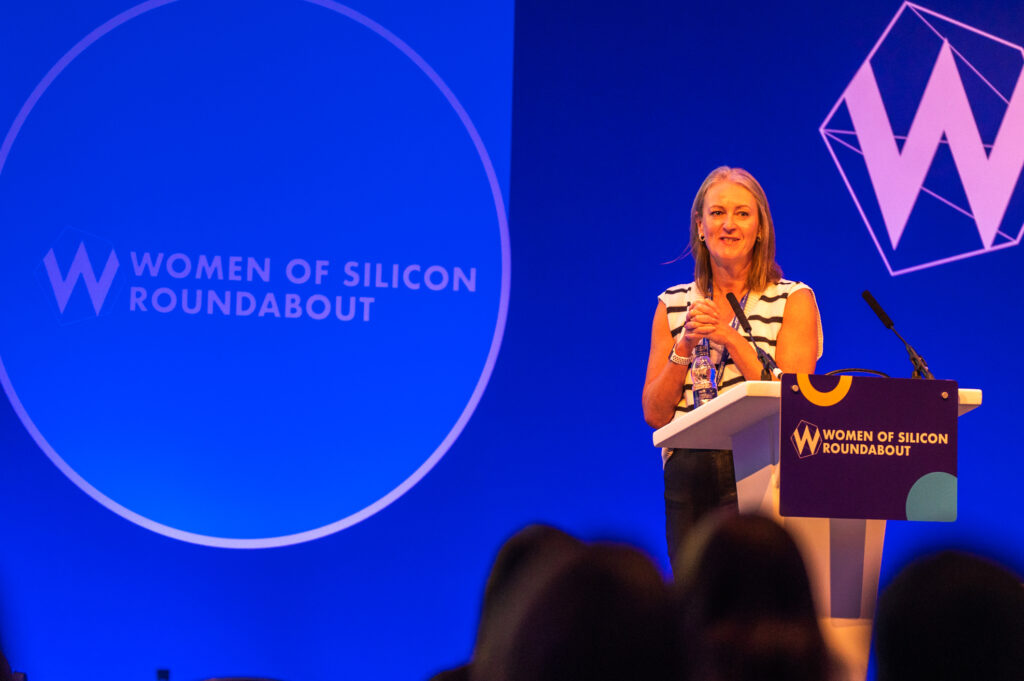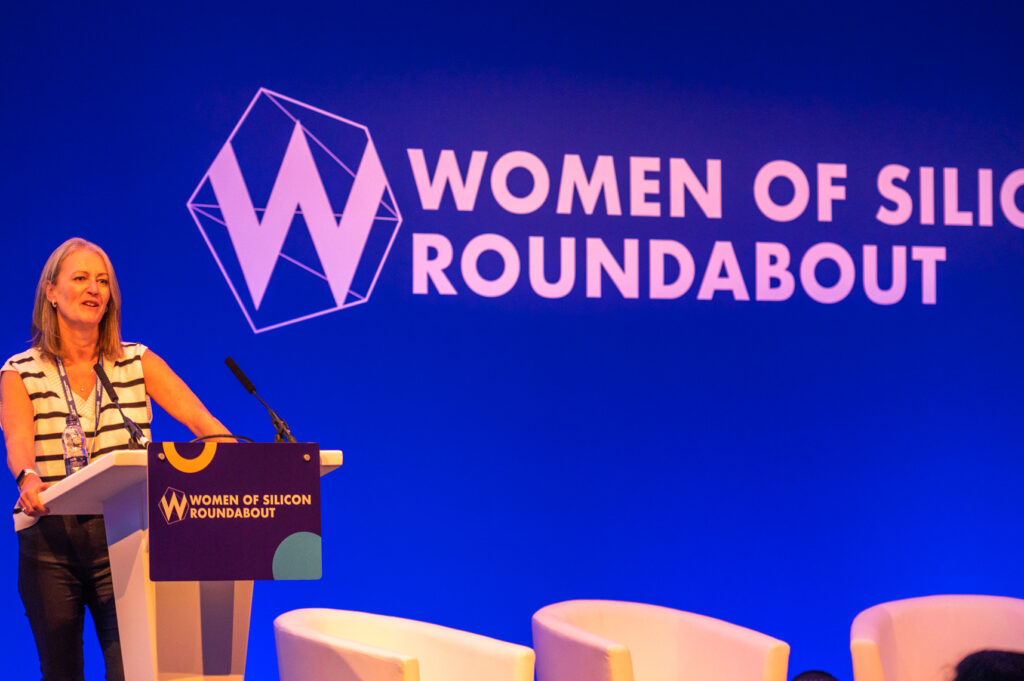
Thirty years and three children later, Rebecca Bunyan’s career is the definition of not just surviving, but thriving in the competitive environment that is the technology industry. As she addresses a room full of fellow colleagues during the Women of Silicon Valley Roundabout Conference, she serves as proof that it is indeed possible to have it all: a successful job and a happy family life, as long as one learns to time-manage and lets go of the fear of failing.
Currently the Chief Information & Change Officer at Lloyd’s of London, Bunyan has previously developed her career across senior technology roles in the consulting, insurance and real estate industries, both in the UK and the US. Bunyan has led the development of the Hiscox NA and EMEA strategies as well as built the technology, data and cybersecurity strategies and functions for Aldermore. Now she is taking those learnings in cyber, technology risk management and resilience to her new role at Lloyd’s. What she enjoys most, Bunyan tells Digital Bulletin, is leading transformation and change programmes.

“I am genuinely energised by challenges and aspire to continue solving difficult problems as my career evolves,” she says. “I am known for holding high standards, both for myself and my teams. My leadership style is ‘collaborative yet decisive’ and I tend to balance analysis with action when considering different approaches. I like to think I am sensitive to others’ needs and the culture I try to create is values-based with respect, consideration and collaboration.”
In Bunyan’s view, leadership is about finding the balance between knowing when to make collaborative decisions and when to act swiftly to avoid getting lost in an ocean of opposing opinions. This is something that people learn throughout their careers, but that is fundamental to have mastered when reaching a senior position, as she has.
Bunyan’s role in Lloyds is also about balance. As the CIO of the company, she needs to make important strategic decisions, often based on objective data. However, as Lloyd’s Change Officer, she also works towards developing programmes that will improve employees’ experiences and help the company transition to new ways of working.
I am known for holding high standards, both for myself and my teams. My leadership style is ‘collaborative yet decisive
“Unlike most companies, we have a huge appetite for change,” she says. “When you deliver projects and programmes, they are usually only as successful as the change management element of that. So bringing people on the journey by educating them in terms of how change is done, and how to do change in the right way, is very important.
“Being the CIO, at the end of the day, it’s all ones and zeros, so there’s only so far you could push it. But being a Change Officer is a much softer side of my role. And yet, the stakeholder management side of it is huge.”
A major part of Lloyd’s change management strategy over the past two years has been the adoption of remote working styles. The company is committed to allowing true flexible working that gives autonomy and trust to its employees and ensures that people’s performances are not judged based on the amount of time they spend in the office, but on the quality of their work.
Flexible Working
Alongside many other benefits, flexible working has made a huge impact on women, for the first time levelling the playing field around childcare and making people aware of the huge time commitment that it entails. At the moment, over 75% of all US caregivers are female and 31% of women who took a career break after having children said they would not have done it had their workplace offered flexible working options, according to a CNBC survey. As companies go back to the office, Bunyan wants to ensure that things do not go back to the way they were before.
“Something I’ve observed around flexible working is that people still seem to think that means nine to five in the office for X number of days,” she says. “Whereas actually, if you haven’t got your first face to face meeting until lunchtime, don’t stress to get in and go in for that. Getting to the real true flexible working is something that I’m really passionate about so that people have that autonomy to get a job done in a period of time. I don’t mind where you are. It’s all about the outcomes.
“I’m confident that if we get that right, we’ll see more women rise in the ranks. That’s something that really excites me because I’d love to see more women in my own organisation pushing and sort of saying: ‘I’m going to have Rebecca’s job’. I’d love that.”
Historically, women have had a harder time accessing senior positions, particularly in the technology sector. There are many reasons behind this, but a fundamental one is the pressure that society places on mothers to assume childcare responsibilities and the challenges that come with trying to manage this alongside a stress-heavy position. In addition to promoting more flexible ways of working that can alleviate the stress of parents, Bunyan also wants to set an example regarding the attitudes that can help women let go of their guilt and focus on what’s really important.
I'd love to see more women in my own organisation pushing and saying: ‘I'm going to have Rebecca's job
“Generally speaking, we are our own worst enemy,” she says. “Because we women just want to please everybody. We put ourselves under so much pressure to please at home and to please at work. Whereas we just need to stand back and say: ‘These are the conditions that I need to put in place to make me successful’. It could be something at home; it could be something at work. And companies just need to encourage women and create the conditions for women to feel empowered to bring that to the table.”
In addition to the support that companies can provide their employees to improve their work/life balance, there are also certain things that everyone can do to make sure that they make the best-use of their time.
When it comes to time management, there is no be-all-end-all recipe for perfect time management, but some things do help. For example, Bunyan keeps an organised diary – although she confesses it’s still a paper one – and is very conscious about the time that she spends on social media. She has also set clear limits for herself when it comes to working late into the evening. In her experience, it only made her more tired in the morning, when she needed to be at her best. Moreover, when she became a mother, finding a good childcare solution was essential.
“I tried lots of different things because I was kind of looking to avoid the investment that there’s going to be needed in the right childcare solution, which ended up being a nanny,” she says. “And yes, it was expensive, but it took the guilt about leaving my children away. Everyone needs to find what works best for them.”
There are endless handbooks on how to achieve success. However, in contrast to popular advice such as waking up an hour earlier to run before work or wearing a defined set of clothes every day, Bunyan says that the key is about changing the way you think. It’s about the attitude and learning to let go. To drive her point home, Bunyan shows during her speaking events a picture of Elsa, from the Disney blockbuster movie Frozen.
“Everybody wants to know: ‘What’s the silver bullet?’, she says. “Well, I’m sorry to say that isn’t one. So don’t get up an hour earlier. It’s not going to help. You’ll feel more tired and probably more stressed.”
“Chuck the thoughts of the perfect time management out of the window. Clear your mind of all the things that are getting you down, and believe in yourself a little bit more. Let go of the guilt and all the things that you spend so much time worrying about, all of these things that may or may not happen.”
Everybody wants to know: What's the silver bullet? Well, I'm sorry to say there isn't one. Chuck the thoughts of the perfect time management out of the window. Clear your mind of all the things that are getting you down, and believe in yourself a little bit more
But Bunyan’s advice of ‘letting go’ goes beyond schedules and routines. It also refers to the way people think about themselves and the issues they worry about that prevent them from reaching their potential. Self-doubt, in her view, can be your worst enemy.
Bunyan opens up about her experience, in the hopes of helping other women who might doubt themselves or their capabilities. She explains that she grew up in Sheffield and, like many of her peers, she left school at 15. Bunyan never did A-levels or got a degree and for many years she felt that because of that, she was less of.
“I carried this thing around on my shoulders for years,” she says. “I was doing well. I was moving up in the world and in my organisation but I had this thing about education, and the doubt of ‘I don’t have a degree, I don’t have a degree.’ So I spent hours and hours and hours on training courses that kind of gave me the points equivalent of a degree. But I didn’t learn much from them if I’m being perfectly honest. I wasted lots of time and I still didn’t have the degree. And I missed out on so much just by striving to achieve something that really didn’t matter in the end. So sometimes you just have to let it go.”
Perfection, although it should be something to strive for, can often be a barrier that keeps people from success. A 2021 survey by HR News found that out of 1,000 adults surveyed about imposter syndrome, 80% of men and 90% of women said they felt less competent at work than their colleagues. Rather than drive competition, perfectionism and imposter syndrome can often stop or slow down people’s careers.
Bunyan wants to help colleagues let go of this guilt, in order to allow them to take risks. It was only when she stopped feeling guilty about being a working mother that she felt confident enough to take a role that required her to travel often to the US and allowed her to rise within her organisation.
“When I think about my career, I’m often asked if I purposely took risks,” she says. “And I don’t think I did. But I’ve always done the things that made me happy. I’ve always tried to follow my heart. Your gut instinct is so powerful in terms of helping you make really good choices. And when you make good choices, you’re going to be happy; you’re going to be fulfilled and the productivity is going to be really really high.
“I was lucky that I almost fell into the technology and loved it ever since. But not everybody gets all those chances. And that for me is about having great leaders and role models that I had in the past and maybe I can be one of those, hopefully, for the future, to encourage people to come in.”
As workplaces become increasingly diverse and open to new ways of working, it is more important than ever to empower young people to aim high and provide them with the tools they need to reach their full potential. The examples of women who have been able to do so, such as Bunyan, is a fundamental part of this effort, serving as proof that letting go of fears and expectations is the key to having it all.
